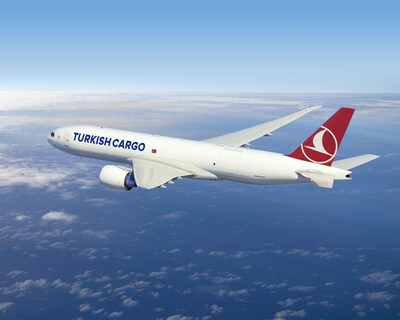Turkish Airlines Orders Four More Boeing 777 Freighters
Boeing and Turkish Airlines have announced a significant order for four Boeing 777 Freighters, bolstering Turkish Airlines' air cargo fleet to 12 units. This move aims to meet rising global demand for air freight, driven by the e-commerce boom and the need for efficient logistics. Turkish Airlines Chief Cargo Officer Ali Türk highlighted that the new freighters will enhance operational capabilities and support the airline's strategic vision to lead the air cargo sector. Paul Righi of Boeing emphasized the importance of their continued partnership and the operational advantages of the 777 Freighter, which has a payload capacity of 102 metric tons and a range of 9,200 kilometers. With over 265 deliveries, the 777 Freighter is Boeing's best-selling cargo aircraft, contributing to more than 90% of dedicated freighter capacity worldwide.
- None.
- None.
Insights
The order for four new Boeing 777 Freighters by Turkish Airlines reinforces the increasing demand for air freight, fueled by the rapid growth of e-commerce. Considering the maximum payload capacity of 102 metric tons and range of 9,200 kilometers, the 777 Freighter is an optimal choice for meeting international cargo needs efficiently. This move strategically positions Turkish Airlines to capitalize on market demand, potentially increasing its market share in the global air freight sector.
Additionally, this order signals a strong continuation of the airline's commitment to expanding its cargo capabilities, which can lead to improved economies of scale and operational efficiencies. With 12 777 Freighters in its fleet, Turkish Airlines could leverage this to enhance its service reliability and timeliness, which are critical factors for success in the freight industry. The ongoing partnership with Boeing, a dominant player with over 90% of the worldwide dedicated freighter capacity, further solidifies Turkish Airlines' competitive edge.
From a financial perspective, the purchase of additional Boeing 777 Freighters may require significant capital expenditure, but it also represents a strategic investment into Turkish Airlines' cargo operations. The potential for increased revenue through enhanced cargo capacity can justify this expenditure. Furthermore, the airline’s ability to tap into the burgeoning e-commerce market could translate into sustained revenue growth.
For Boeing, this order is a positive indicator of continued demand for its freighter aircraft, potentially contributing to stable and predictable revenue streams. Given Boeing's existing contract and market share, this order might signal improved investor confidence in Boeing’s commercial aerospace segment. It also underscores the resilience and expanding nature of the cargo airline market, which can be a vital buffer against fluctuations in passenger airline demand.
"This new investment in expanding our cargo fleet underscores our commitment to meeting the growing global demand for air freight services," said Turkish Airlines Chief Cargo Officer Ali Türk. "The addition of these Boeing 777 Freighters will not only enhance our operational capabilities, but also serve as another step in our strategic vision to reach the top of air cargo sector worldwide while maintaining our leading position with our unparalleled service and efficiency for our customers across the globe."
Turkish Airlines' purchase of additional 777 Freighters will help the carrier meet growing demand for freight services, driven by the rapid growth of e-commerce and the need for efficient and reliable transportation across the globe. The new freighters will enable Turkish Airlines to optimize its cargo operations, reduce costs and deliver goods to destinations worldwide on time.
"We are proud to continue our long-standing partnership with Turkish Airlines and support its expansion of cargo operations with the addition of Boeing 777 Freighters," said Paul Righi, vice president of Boeing Commercial Sales for Eurasia. "The 777 Freighter's payload capacity, range and flexibility will enable Turkish Airlines to deliver exceptional customer service while maximizing operational efficiency."
The Boeing 777 Freighter is the world's most capable twin-engine freighter with a maximum payload capacity of 102 metric tons (112 tons) and a range of 9,200 kilometers (4,970 nautical miles).
With more than 265 deliveries, the 777 Freighter is Boeing's best-selling freighter airplane of all time. As the market leader in cargo airplanes, Boeing provides more than
In addition to freighters, Turkish Airlines operates a fleet of Boeing airplanes that includes the 777-300ER (Extended Range), Next-Generation 737, 737 MAX and 787 Dreamliner.
As a leading global aerospace company, Boeing develops, manufactures and services commercial airplanes, defense products and space systems for customers in more than 150 countries. As a top
Contacts
Elena Alexandrova, Boeing Communications
elena.alexandrova@boeing.com
Tel: +971 56 687 69 87
Boeing Media Relations
media@boeing.com
Turkish Airlines Media Relations
press@thy.com
Tel: +90 (212) 463 63 63 ext. 11153 / 11173
![]() View original content to download multimedia:https://www.prnewswire.com/news-releases/turkish-airlines-orders-four-more-boeing-777-freighters-302187724.html
View original content to download multimedia:https://www.prnewswire.com/news-releases/turkish-airlines-orders-four-more-boeing-777-freighters-302187724.html
SOURCE Boeing








